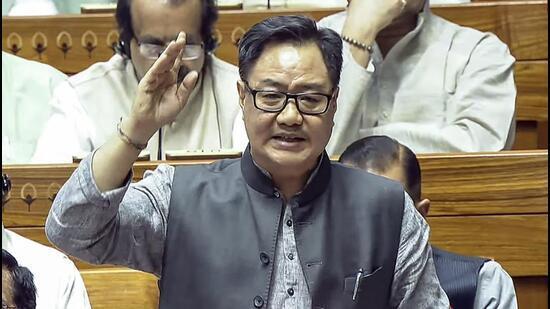
Opposition Creates Confusion & Leaves House: Rijiju in Rajya Sabha
The Rajya Sabha witnessed a heated debate on the Waqf (Amendment) Bill recently, with Union Minister Kiren Rijiju taking a strong stand against senior opposition members for creating confusion and then leaving the House without listening to the replies. The minister’s remarks were made during the discussions on the bill, which aimed to amend the Waqf Act of 1995.
Rijiju, the Minister of State for Youth Affairs and Sports, criticized Kapil Sibal, a senior member of the opposition, for creating confusion by comparing the properties of Waqf bodies with those of other religious bodies. According to Rijiju, Sibal’s statements were misplaced and had the potential to create unnecessary tension in the House.
“It’s unfortunate that some senior members of the House, who are supposed to be aware of the facts, are creating confusion and then leaving the House without staying back to listen to the replies,” Rijiju said. “This is not the way to conduct a constructive debate in the House.”
Rijiju’s remarks were in response to Sibal’s statements during the debate, which compared the properties of Waqf bodies with those of other religious bodies. Sibal had argued that the Waqf bodies had more properties than some other religious bodies, which Rijiju disputed. The minister claimed that the Waqf bodies had limited properties and that the comparison made by Sibal was inaccurate.
Rijiju’s attack on Sibal was not limited to his statements on the Waqf bodies. The minister also criticized the senior opposition member for not staying back to listen to the replies to his questions. “It’s not just about asking questions, but also about listening to the replies,” Rijiju said. “If you ask a question, you should also listen to the reply. This is the way to conduct a constructive debate in the House.”
The minister’s remarks were likely aimed at highlighting the importance of constructive debate in the House. Rijiju’s criticism of Sibal was not meant to be personal, but rather to emphasize the need for opposition members to engage in constructive debate and not create unnecessary confusion.
Rijiju’s attack on Sibal was not the only issue that was raised during the debate on the Waqf (Amendment) Bill. Other opposition members also expressed their concerns about the bill, which they claimed would undermine the autonomy of the Waqf bodies. The bill aims to amend the Waqf Act of 1995, which established the Waqf bodies to manage the properties of the Muslims.
The bill has been criticized by some opposition members, who claim that it will give the government more control over the Waqf bodies. The opposition members have also argued that the bill will undermine the autonomy of the Waqf bodies and that it will not benefit the Muslims.
In response to the opposition’s concerns, Rijiju claimed that the bill was aimed at improving the governance of the Waqf bodies and that it would benefit the Muslims. The minister claimed that the bill would ensure transparency and accountability in the management of the Waqf properties and that it would also provide more opportunities for the Muslims to participate in the management of the Waqf bodies.
The debate on the Waqf (Amendment) Bill is an important issue that has far-reaching implications for the Muslims in India. The bill aims to amend the Waqf Act of 1995, which established the Waqf bodies to manage the properties of the Muslims. The bill has been criticized by some opposition members, who claim that it will undermine the autonomy of the Waqf bodies and that it will not benefit the Muslims.
In conclusion, the debate on the Waqf (Amendment) Bill in the Rajya Sabha highlights the importance of constructive debate in the House. Rijiju’s attack on Sibal was not meant to be personal, but rather to emphasize the need for opposition members to engage in constructive debate and not create unnecessary confusion. The bill aims to improve the governance of the Waqf bodies and to provide more opportunities for the Muslims to participate in the management of the Waqf properties.
Sources:



